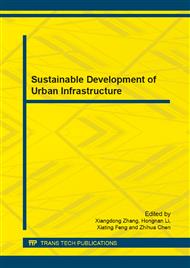p.835
p.840
p.847
p.853
p.857
p.861
p.865
p.871
p.875
Researches on Environmental Value of Existing Buildings' Adaptive Reuse
Abstract:
The construction industry is one of the important environment-polluting industries in global. Aims at the present “short-lived” phenomenon of existing building in China, This paper firstly introduced the concept of Embodied Environment Effect Factor (EEEF) and on the platform of this concept; the whole life cycle EEEF value is calculated. The result shows that constantly updated and reuse to extend the life of the building in its life cycle, reducing the probability of demolition and reconstruction, will be an effective means to reduce resource consumption and environmental damage.
Info:
Periodical:
Pages:
857-860
Citation:
Online since:
December 2012
Authors:
Keywords:
Price:
Сopyright:
© 2013 Trans Tech Publications Ltd. All Rights Reserved
Share:
Citation:


